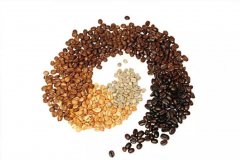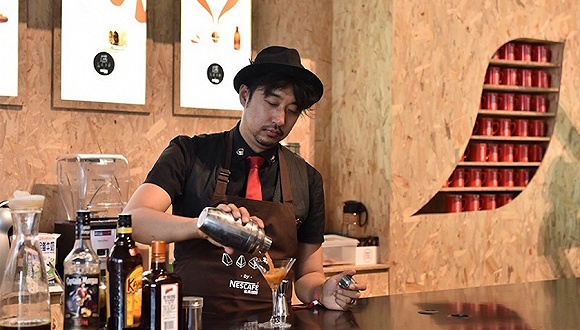Introduction to Taste and Taste how to cultivate your own sense of taste

For professional baristas, please follow the coffee workshop (Wechat official account cafe_style)
Wedge
Eyes, ears, nose, tongue, body
Touch method of color, sound, aroma and taste
Eye, ear, nose, tongue, body, mind.
Six acquaintances to six worlds
Six acquaintances belong to you.
Six dusts belong to the world.
How big is your world?
How old is that? Is your boundary.
Taste and Taste (2) 02:58 on 2007-09-04
The first chapter of enlightenment
Have we ever thought about how our sense of taste and taste are established?
My daughter had a strange habit when she was a child. She never touched any black food! Because when she was very young, her aunt cooked a balsam pear stew, which was blackened and sticky to the bottom, so her aunt was reluctant to throw it away and scraped up the upper layer to eat it. My daughter happened to eat the sticky balsam pear. From then on, she didn't eat anything that looked black for a long time. Like Seaweed soup, kelp, fungus and so on, as long as it is black, she will change the dish to the farthest place from her, as long as it is black. It is best not to see it. Because in her young mind, she thought that as long as it was black, it would not taste good. It wasn't until after grade 5-6 that she gradually realized that it didn't taste like that until it was burnt out. Not all black food tasted like that, and that dish was very much served. Now she likes that dish very much, and sometimes she hopes to eat it every day.
In fact, we did not eat a lot of food when we were young, such as balsam pear, green pepper and eggplant, almost all of which were unpopular foods. They usually have to rack their brains to find a way to make it invisible in order to tempt them to eat. Some children do not eat fruit; for example, when my daughter clearly sells drinks at home, she must have a can of drinks at 7-11 a day. She often tells her that she is free and healthy, so why do you spend money on flavored sugar water? her answer is: wash and cut every time, and collect it after it is done. I'm not interested in drinking. When eating fruit, she would never move it if it wasn't properly peeled and seeded.
That's probably how we grew up!
In our traditional eating habits, cooking must be fragrant when cooking, not onions or garlic, but also fishy, using rice wine, so there must be these three things in the kitchen. When you go to the market to buy food, you usually have two spring onions. You will buy it if you don't give it away. Soy sauce, flavor element must also have. Chili peppers, shredded ginger, and -. It seems that apart from these, of course, there are a lot of sauces, such as bean paste, sand tea sauce, sweet noodle sauce, chili sauce, and vinegar, especially the industrial research vinegar, which has a very strange and strong flavor of chemical fermentation. however, if you replace the industrial research vinegar with Zhenjiang vinegar, you will feel that Zhenjiang vinegar has only sour taste.
From childhood to childhood, it seems that few dishes in our eating habits are simply that dish itself, which must be fragrant and seasoned. There are few dishes that simply show a single method of cooking? For example, when steaming fish, it will only steam the fish, not with shredded ginger, some onions and garlic, sprinkle with wine, etc., I mean, we rarely eat the way that shows the taste of the ingredient itself. it's the way we want to eat what we want. How on earth did we build the flavor we want to eat? How much time does it take us to know and understand the so-called taste? In other words, have we ever asked our sense of taste to learn taste?
Tian Mu's loyalty Road used to be a large rice field, and when she walked into it, it was a scene of the countryside. Later, a large area of land was expropriated and a road now called loyalty Road was opened. During the period when it was just opened, there were no buildings on both sides. Still maintaining the appearance of rice fields, slowly gave birth to a brewery, in its heyday more than 50, at that time was still young, and was very keen on a group of people to go there for a few glasses of draft beer. Salty and spicy fried snail meat, salt crispy dragon balls, three cups of frogs, with 2000CC giant draft beer, is one of the great joys of life. In particular, it is still unfinished for that draft beer to drink 3-4 cups. When you drink wine, it is always a cup of wine, and you will not go back until you get drunk. Later, when he went to a friend's house for a drink, his house was near the Comptroller and Accounting Office of Hangzhou North Road, where there used to be a draft beer distribution office of the Public Marketing Bureau. On that day, he made a bucket of stainless steel draft beer. He said that this was real draft beer. After drinking it, it was amazing, really strong, mellow and fragrant. It turns out that all the draft beer drunk outside is filled with water, so it's no wonder that you just keep going to the toilet if you don't get drunk. I probably felt bad if I couldn't drink 4000CC that day.
What's the real taste?
When we go to comment on whether a cup of coffee is good or not, do we ever think about what we should comment on?
Many people say: [taste is subjective], each has its own preferences do not impose their own preferences on others, to respect the preferences of others.
But what is the real taste? How much have you worked hard for the taste of your subjective perception?
How is your subjective perception established?
When you say citrus, do you know which part of citrus it is? Is it the leather part? Or part of the flesh? Or is the flesh attached to the white silk? Have you ever eaten a citrus carefully? Have you ever separated the flesh from that white silk and ate only pure flesh? Have you ever eaten the peel? Have you ever eaten the white silk that only adheres to the flesh? Can you tell the difference between willow, fragrant cheese, sea snail orange, mandarin, grapefruit, grapefruit and white pomelo? These are all oranges. Have you ever eaten when they were raw, half-cooked, fully ripe, when they were about to rot and ferment?
We are happy in Taiwan, there are too many fruits for us to enjoy, but how much do we know about taste and taste?
Besides, many people say that the taste is subjective, and at the beginning it is a misconception that what a thing has, and that taste belongs to that thing, for example, sugar, sugar is sweet, sweetness belongs to sugar. Who can taste the sweetness? It is your sense of taste, your feeling of taste, it is you, me, you and I who have taste, we have habits and likes and dislikes, so we have subjective cognition, and taste is tried out as an objective object. I say this to show that the taste of a cup of coffee is fixed and already exists. Will have different feelings because different people taste, the taste of the feeling is subjective, belongs to each taste of the individual, but the taste is fixed, is an object to be tasted. Different cups have different tastes, and different temperatures have different tastes, but the taste it shows to you at the moment you taste is fixed and is felt by your sense of taste. The sense of taste is subjective, because everyone tastes different and makes us think that the taste will change. in fact, the taste of each individual is different, not the taste is different. so today we can guide when we taste a [taste], guide your [sense of taste] to feel [taste], for example, where the acid is, what acid, whether the acid is trickling down or spreading. Taste is learning, and taste is the object of being learned and felt.
If a cup of coffee has 100 flavors, your taste has 20 flavors, and my taste has 50 flavors, what problems will we encounter when we want to discuss this cup of coffee?
If there is a bag of beans, you cook a cup, I cook a cup, you cook that cup has 10 kinds of good taste, 5 kinds of bad taste. This cup I cooked has 30 good tastes and no bad tastes. What problems will we encounter when we want to talk about this bag of beans?
If there is a bag of raw beans, you bake 10 kinds of good taste and 8 kinds of bad taste, and I bake 20 kinds of good taste but no bad taste, what problems will we encounter when we talk about this bag of raw beans?
There is only one way to bake well in your baking technology, and there is only one way to cook it that must be done this way. your sense of taste has little to say about taste. And I have ten ways to bake well, I have ten ways to make coffee, and I train my sense of taste to try to distinguish between flavors. What will happen to us when we talk about coffee at this time?
Replace me with you, what will you think of me when you want to discuss coffee with me?
Now there is a comic book about wine that is very popular. There is a paragraph describing the father of the protagonist training the taste of the protagonist, taking him to eat all kinds of delicacies from an early age, and made by famous chefs. To all kinds of grape producing area accommodation food, to that can let him feel the beautiful environment and force him to learn the ability to create beauty, the ability to appreciate beauty -! The protagonist is very unhappy and even resentful when recalling all kinds of things between him and his father. But when he found that he could taste something that no one else could, and he easily did what the average sommelier had for 10 years, he realized that his father had let him try all kinds of tastes while he was still learning to walk, enlightening his sense of taste.
When do we begin to enlighten our sense of taste? How do we enlighten our sense of taste?
Taste is not learned, it comes from osmosis, it comes from immersion. A person's taste is because she is in an environment that shows that taste, and a supermodel will never show aristocratic taste. unless it's an aristocrat.
When we talk about a taste, do we have a sense of taste enough to distinguish that taste?
Important Notice :
前街咖啡 FrontStreet Coffee has moved to new addredd:
FrontStreet Coffee Address: 315,Donghua East Road,GuangZhou
Tel:020 38364473
- Prev

The relationship between the formation of Taste and Taste and ethnic Culture in Baking Theory
Professional baristas exchange please follow the coffee workshop (Wechat official account cafe_style) taste and taste (3) (1) 5 years have passed in the blink of an eye-distance from the previous article. What have I been doing for the past five years? -I'm going to build my baking theory. Through the roaster made by myself, the appearance that I think coffee should have is gradually clear. Very
- Next

Nestle Coffee wants to use a pop-up store to make you feel creative, lifestyle and art.
Professional baristas Please follow the Coffee Workshop (official Wechat account cafe_style) if you are used to making a bag of instant coffee in the office or at home, you may not expect that one day you will be able to walk into the Nestle cafe and open a coffee shop called Gan CAFE in Sanlitun, Beijing, where hipsters gather. There is special coffee with marshmallows, milk lids and even cocktails, covered with white artificial.
Related
- The ceremony is full! Starbucks starts to cut the ribbon at a complimentary coffee station?!
- A whole Michelin meal?! Lucky launches the new "Small Butter Apple Crispy Latte"
- Three tips for adjusting espresso on rainy days! Quickly find the right water temperature, powder, and grinding ratio for espresso!
- How much hot water does it take to brew hanging ear coffee? How does it taste best? Can hot water from the water dispenser be used to make ear drip coffee?
- What grade does Jamaica Blue Mountain No. 1 coffee belong to and how to drink it better? What is the highest grade of Blue Mountain coffee for coffee aristocrats?
- What are the flavor characteristics of the world-famous coffee Blue Mountain No. 1 Golden Mantelin? What are the characteristics of deep-roasted bitter coffee?
- Can I make coffee a second time in an Italian hand-brewed mocha pot? Why can't coffee be brewed several times like tea leaves?
- Hand-brewed coffee flows with a knife and a tornado. How to brew it? What is the proportion of grinding water and water temperature divided into?
- What is the difference between Indonesian Sumatra Mantinin coffee and gold Mantinin? How to distinguish between real and fake golden Mantelin coffee?
- What does bypass mean in coffee? Why can hand-brewed coffee and water make it better?

